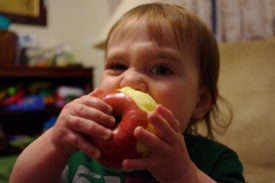Teen pregnancy rates are falling; and adult couples are having fewer children and having them later in life. We mostly attribute these trends to lifestyle choices and public policies. But what if the real explanation—or part of it anyway—is actually chemical?
Are toxics, perhaps pesticides, actually impairing human fertility? An intriguing article in Slate takes up this question. It’s a short, but fascinating review of a growing body of scientific evidence that chemical concentrations may be reducing male sperm counts, by as much as 3 percent a year in some instances. More in rural areas than urban ones. More in Europe than in the United States. What’s going on?
I’m not nearly knowledgeable enough on this issue to know how seriously to take the research. But I’d be curious to know what others think of this stuff…








Susan
I checked out the article by Swan in EHP and 2 things stand out. Her study addresses 2 issues that had been problematic in previous studies: 1) the study population – her study used men that were partners of women at prenatal clinics vs. semen donors or infertility clinics, which have self-selection & other issues; and 2) she considered spatial issues by separating the data by demographics (agricultural/rural vs. urban). She also did another study that suggested an association between pesticide residues in men’s urine and reduced sperm quality (Swan SH, Semen quality in fertile US men in relation to geographical area and pesticide exposure. Int J Androl. 2006 Feb;29(1):62-8; discussion 105-8). More studies of this kind with larger sample sizes would help strengthen causation, but this is a good beginning. And if you believe in the cautionary principle – good evidence to start curbing the use of some of these chemicals.
Alan Durning
The toxics-infertility linkage is worth serious consideration and research.And it’s another reason for precaution, as Susan argues.But my own reading suggests it’s an extremely minor cause of declining fertility.Mostly, fertility is declining because people want it to be declining.